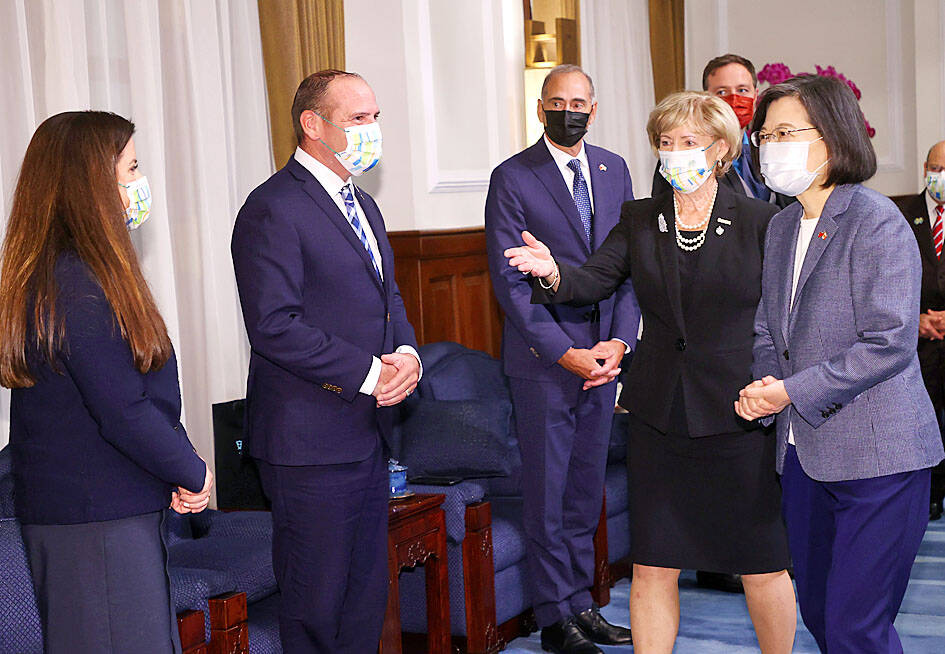President Tsai Ing-wen (蔡英文) yesterday said she hopes Canada will support Taiwan’s bid to join the Comprehensive and Progressive Agreement for Trans-Pacific Partnership (CPTPP). Tsai was addressing members of the Taiwan-Canada Parliamentary Friendship Group at the Presidential Office in Taipei.
“Last year, Taiwan formally submitted its application to join the CPTPP. Our economies are matched. We hope Canada will support Taiwan’s accession to the CPTPP,” Tsai said.
“Together we can promote more economic and trade cooperation, and generate even more prosperity,” Tsai told the Canadian delegation.

Photo: CNA
Canada’s bilateral trade with Taiwan is growing faster than its trade with any other Asian nation, Tsai said, adding that two-way trade last year increased more than at any time since 1995.
Early this year, Taiwan and Canada jointly announced the launch of exploratory talks on a foreign investment promotion and protection agreement (FIPA) between the two countries, Tsai said.
Signing such an agreement would create a more open, transparent and friendly environment, and bolster bilateral economic and trade links, she said.
Tsai thanked Canada for its support of Taiwan, particularly after China in early August stepped up military exercises around Taiwan following US House of Representatives Speaker Nancy Pelosi’s visit to the nation.
Last month, a Canadian naval vessel conducted freedom of navigation operations in the Taiwan Strait to help uphold regional peace and stability, she said.
The delegation, led by Canadian lawmaker Judy Sgro, attended the Double Ten National Day celebrations in Taipei on Monday.
In addition to chairing the parliamentary group, Sgro also chairs the Standing Committee on International Trade in the Canadian House of Commons.
The delegation arrived before Taiwan is due to relax COVID-19 border controls tomorrow.
Sgro told Tsai that her National Day address laid out her priorities for Taiwan, in which the two countries have shared interests.
“I believe that Taiwan’s response to [the] COVID-19 pandemic really accelerated the knowledge and the understanding of what Taiwan has accomplished: Not only what it has already accomplished, but its potential for tomorrow,” she said.
Following Russia’s invasion of Ukraine, Taiwan donated millions of dollars and sent more than 100 tonnes of humanitarian aid to Ukrainian refugees, Sgro said.
“Taiwan in my opinion has demonstrated a very solid record on complying with the CPTPP... I believe most of the parliamentary members in Canada hope that [Taiwan’s] accession to the CPTPP will happen sooner than later,” she said.
Sgro also said she is pleased that officials from both countries are engaging in exploratory talks regarding a FIPA.
“My understanding is that things have continued to progress very well. It would be a wonderful opportunity for businesses in Canada and Taiwan to have that kind of investment opportunity,” she said.
Sgro said she is confident there would be more partnership opportunities as the two countries work on their Indo-Pacific strategies.
“If we look at the amount of unrest in the world, whether it was in Ukraine or in Iran, we look at the people demanding access to human rights. All they have to do is to look at Taiwan: what you have created and what you have done,” she said.

Three batches of banana sauce imported from the Philippines were intercepted at the border after they were found to contain the banned industrial dye Orange G, the Food and Drug Administration (FDA) said yesterday. From today through Sept. 2 next year, all seasoning sauces from the Philippines are to be subject to the FDA’s strictest border inspection, meaning 100 percent testing for illegal dyes before entry is allowed, it said in a statement. Orange G is an industrial coloring agent that is not permitted for food use in Taiwan or internationally, said Cheng Wei-chih (鄭維智), head of the FDA’s Northern Center for

LOOKING NORTH: The base would enhance the military’s awareness of activities in the Bashi Channel, which China Coast Guard ships have been frequenting, an expert said The Philippine Navy on Thursday last week inaugurated a forward operating base in the country’s northern most province of Batanes, which at 185km from Taiwan would be strategically important in a military conflict in the Taiwan Strait. The Philippine Daily Inquirer quoted Northern Luzon Command Commander Lieutenant General Fernyl Buca as saying that the base in Mahatao would bolster the country’s northern defenses and response capabilities. The base is also a response to the “irregular presence this month of armed” of China Coast Guard vessels frequenting the Bashi Channel in the Luzon Strait just south of Taiwan, the paper reported, citing a

The Chinese military has built landing bridge ships designed to expand its amphibious options for a potential assault on Taiwan, but their combat effectiveness is limited due to their high vulnerability, a defense expert said in an analysis published on Monday. Shen Ming-shih (沈明室), a research fellow at the Institute for National Defense and Security Research, said that the deployment of such vessels as part of the Chinese People’s Liberation Army (PLA) Navy’s East Sea Fleet signals a strong focus on Taiwan. However, the ships are highly vulnerable to precision strikes, which means they could be destroyed before they achieve their intended

UNDER PRESSURE: The report cited numerous events that have happened this year to show increased coercion from China, such as military drills and legal threats The Chinese Communist Party (CCP) aims to reinforce its “one China” principle and the idea that Taiwan belongs to the People’s Republic of China by hosting celebratory events this year for the 80th anniversary of the end of World War II, the “retrocession” of Taiwan and the establishment of the UN, the Mainland Affairs Council (MAC) said in its latest report to the Legislative Yuan. Taking advantage of the significant anniversaries, Chinese officials are attempting to assert China’s sovereignty over Taiwan through interviews with international news media and cross-strait exchange events, the report said. Beijing intends to reinforce its “one China” principle